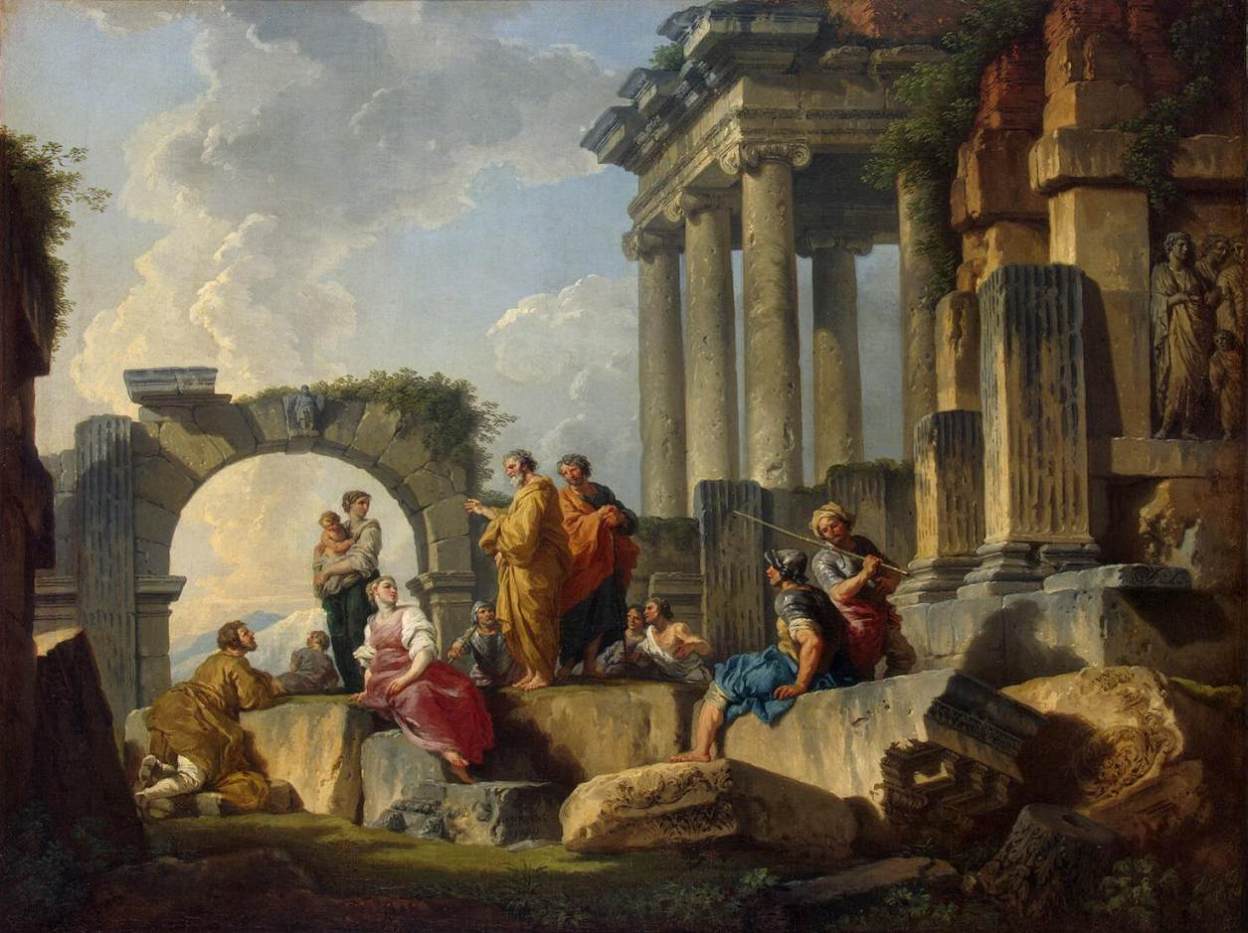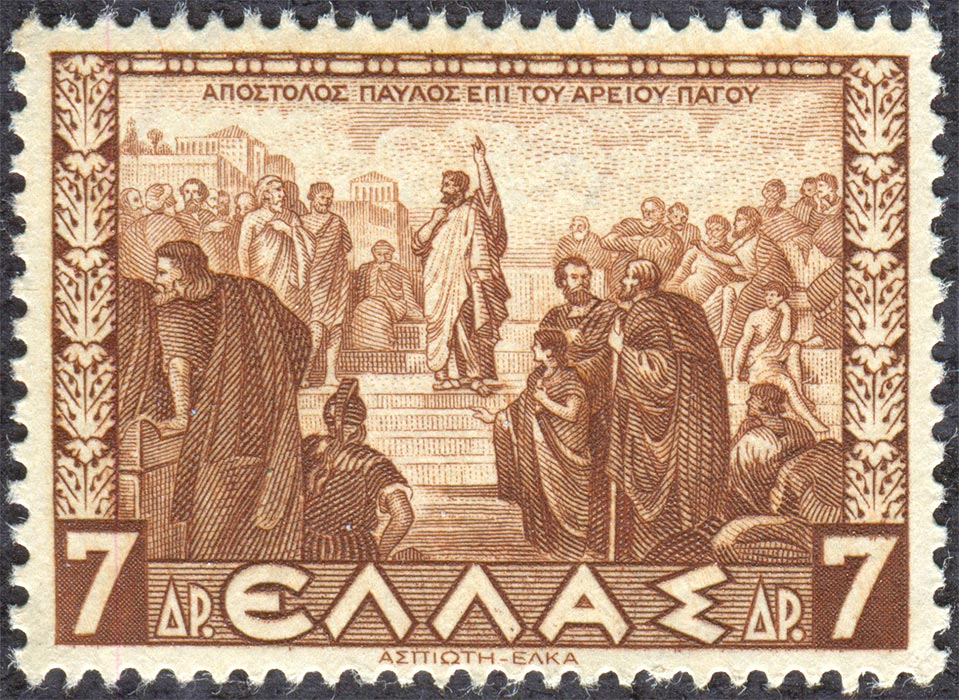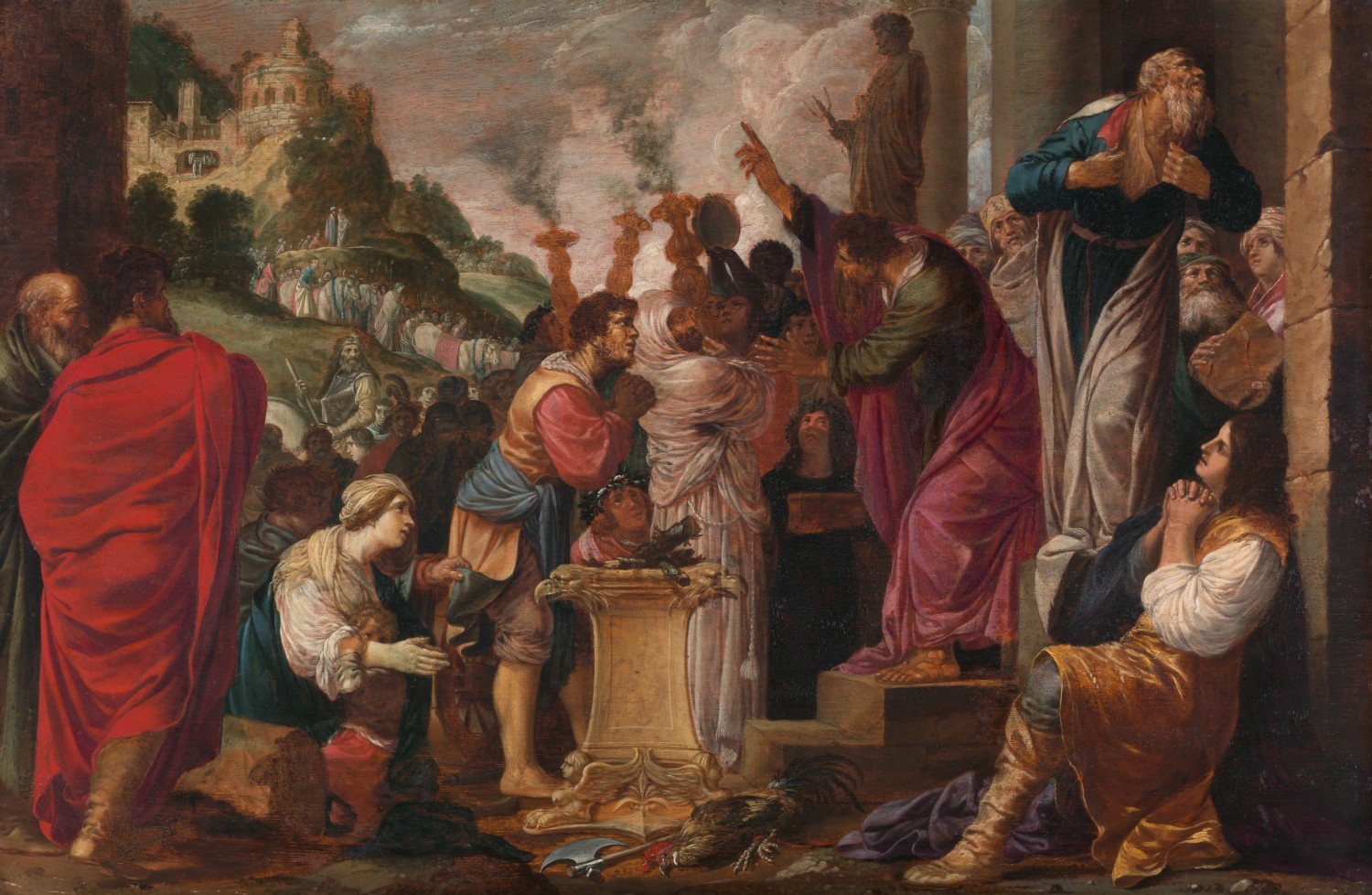[The AMAIC is generally inclined to give precedence to the Hebrews, as having influenced the pagan Greeks – and not the other way around]
….
Only lately have I really begun to appreciate how much literary allusion there is in the New Testament. The books of the Christian canon were not written in a vacuum — its authors were literate, educated Greek speakers who drew heavily upon other writings from both the Jewish and Greek cultural spheres. My unfamiliarity with most ancient Greek literature has made me uncomfortably aware of how much context I am missing when I read the New Testament. As I explore the sources that influenced early Christian writing, I plan on blogging about them here. Today, I begin with Epimenides.
Who was Epimenides?
Epimenides was a Greek poet and seer from Knossos on the isle of Crete. He lived in the sixth century BCE and became known as one of the “Seven Wise Poets” in ancient Greece.
Among other things, he was famous as the original Rip Van Winkle. According to widely-known legends, he once lay down for a nap in a cave while searching for a lost sheep. When he woke up, it was some fifty years later, and scarcely nothing was recognizable to him. He soon gained renown as a “favourite of heaven” and was thought to have received divine revelation from Zeus during his sleep.
Epimenides was also a priest of the cult of Zeus on Crete, acquainted with the famous lawgiver Solon, and reputed to survive on almost no food. He was known as a seer or prophet, but according to Aristotle, he only practised divination about the past, not the future.
The Deliverance of Athens
There is a particular episode from the life of Epimenides related by the biographer Diogenes Laertius that is of some interest. According to this story, Athens was being attacked by pestilence, and after consulting with the Oracle of Delphi, the Athenians sent a ship to Crete to ask for the help of Epimenides.
Epimenides agreed to help the Athenians. He came to Athens and brought some sheep to the Areopagus — an important location in Athens, also known as Ares Rock or Mars Hill. He released the sheep and allowed them go to where they pleased. Wherever a sheep lay down, Epimenides had the spot marked so that sacrifices could be made to the unknown local divinity there. Epimenides’ remedy worked, and Athens was delivered from its scourge. Thus, from that day onward, visitors to Athens would find altars to unknown gods around the city.
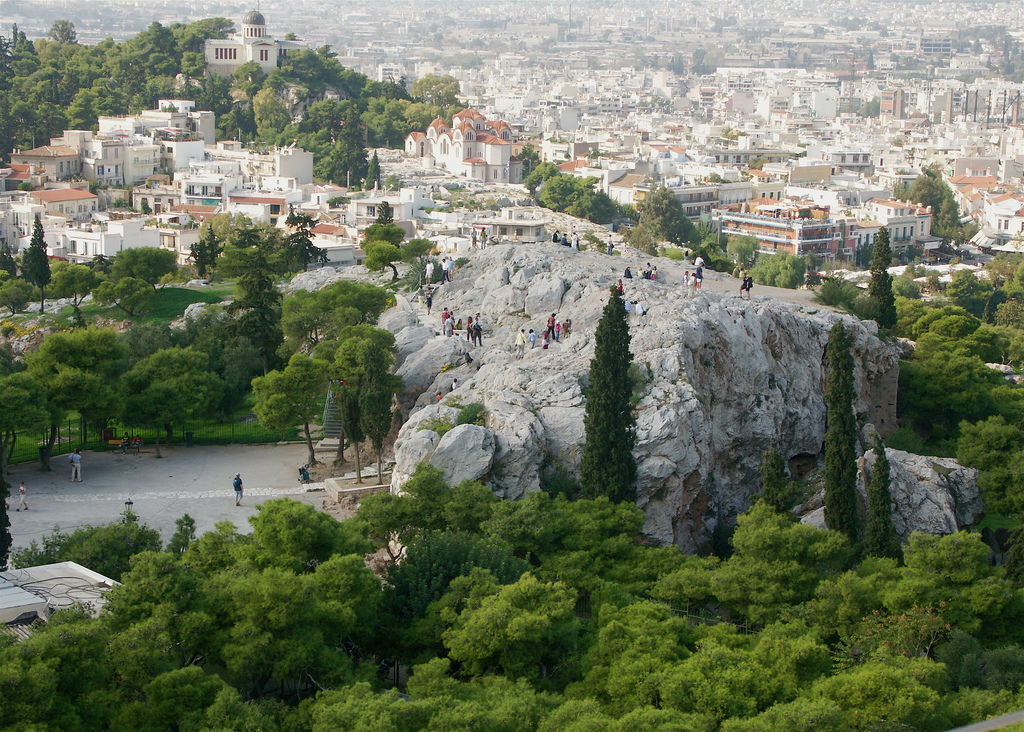
“It was one of them, their very own prophet…”
The Epistle to Titus is one of the Pastoral Epistles, ostensibly written by Paul the apostle, but generally recognized as a pseudepigraphic work since the late 19th century.¹ It is addressed to its namesake Titus, a companion of Paul’s in Galatians and 2 Corinthians who appears here in the role of a bishop to the churches in Crete. (I will leave aside interpretation matters, such as whether the addressee in the Epistle to Titus is meant to represent an actual individual or not.) The writer warns Titus about opponents spreading lies in the form of false doctrines on Crete. He emphasizes his point with an interesting quotation in Titus 1:12–13a:
It was one of them, their very own prophet, who said, “Cretans are always liars, vicious brutes, lazy gluttons.” That testimony is true.
The writer seems to expect his readers to be familiar with the quotation, so he does not provide a source. However, several early Christian writers, including Clement of Alexandria, John Chrysostom, Epiphanius, and St. Jerome, identified Epimenides as its source. These writers felt obliged to identify explain the quote’s origin in order to address the reasons why Paul would authoritatively cite a pagan prophet (and indeed call him a prophet in the first place), smoothing over any theological qualms some readers might have.
Since none of Epimenides’ works have survived to the modern age, it is mainly thanks to the patristic writers that we know the origin of Titus 1:12. Its exact context and the title of the work in question have long been a mystery, however (Jerome called it Oracles of the Poet of Crete, while John Calvin referred to it as Concerning Oracles). One possibility regarding its context is suggested by another ancient poet, Callimachus, who paraphrased Epimenides in his own Hymn to Jupiter.
The Cretans, prone to falsehood, vaunt in vain,And impious! built thy tomb on Dicte’s plain;
For Jove, th’ immortal king, shall never die,
But reign o’er men and Gods above the sky.
This poem addresses a popular idea frowned upon by the cult of Zeus — namely that Zeus had once lived as a king on earth, and then died. In fact, there was even a tomb on Crete that some claimed was that of Zeus. Thus, the Cretans were to be condemned as liars for spreading false myths about Zeus, much as they were accused of doing with respect to the God of Christianity in the Epistle to Titus. The point is not necessarily to paint all Cretans this way. Rather, as Lawlor puts it, it was “a sort of rhetorical generalization based on a single fact” — an allusion to a specifically religious heresy.²
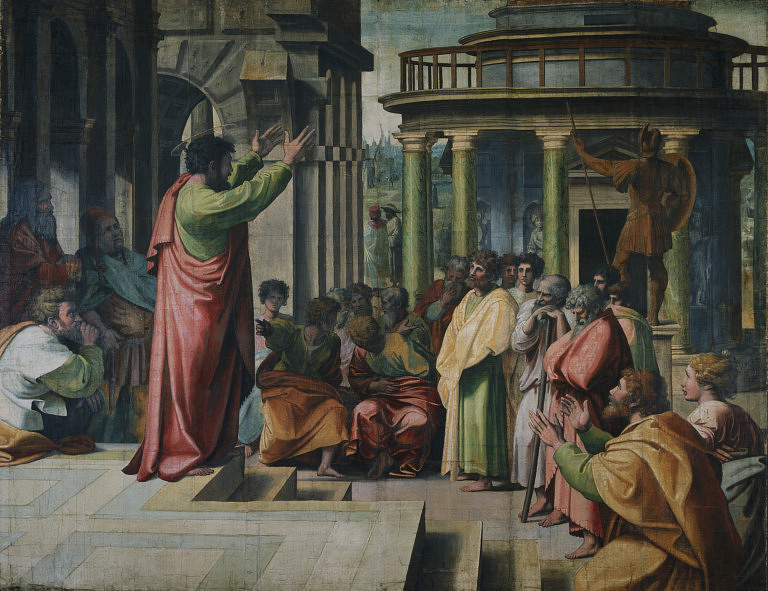
“As even some of your poets have said…”
There appears to be one other quotation of Epimenides in the New Testament, and it comes from the same work of his — the same passage, in fact. However, it was largely unknown until fairly recently, although many of the clues were there.
Shortly after the turn of the 20th century, a professor named Rendel Harris discovered a longer quotation from Epimenides’ Minos and Rhadamanthus in the Syrian lectionary Garden of Delights and in a 9th-century commentary on Acts by Isho’dad of Merv — both dependent on a now-lost work by Theodore of Mopsuestia (c. 400 CE). Harris found that the passage (quoted in Syriac) could be back-translated into good hexameter Greek poetry. An English translation is as follows:
A grave has been fashioned for thee, O holy and high One,The lying Cretans, who are all the time liars, evil beasts, idle bellies;
But thou diest not, for to eternity thou livest and standest,
For in thee we live and move and have our being.
Line two in Greek is identical to the quotation in Titus 1:12. However, the passage was quoted by Isho’dad as the source of Acts 17:28a. Let’s look at that verse in context:
While Paul was waiting for them in Athens… some Epicurean and Stoic philosophers debated with him. Some said, “What does this babbler want to say?” Others said, “He seems to be a proclaimer of foreign divinities.” …So they took him and brought him to the Areopagus and asked him, “May we know what this new teaching is that you are presenting? It sounds rather strange to us, so we would like to know what it means.” Now all the Athenians and the foreigners living there would spend their time in nothing but telling or hearing something new.Then Paul stood in front of the Areopagus and said, “Athenians, I see how extremely religious you are in every way. For as I went through the city and looked carefully at the objects of your worship, I found among them an altar with the inscription, ‘To an unknown god.’ What therefore you worship as unknown, this I proclaim to you. The God who made the world and everything in it, he who is Lord of heaven and earth, does not live in shrines made by human hands, nor is he served by human hands, as though he needed anything, since he himself gives to all mortals life and breath and all things. From one ancestor he made all nations to inhabit the whole earth, and he allotted the times of their existence and the boundaries of the places where they would live, so that they would search for God and perhaps grope for him and find him—though indeed he is not far from each one of us. For ‘In him we live and move and have our being’; as even some of your own poets have said, ‘For we too are his offspring.’
We now understand more clearly the scene with which we are presented in Acts 17 — which should probably be understood as a literary creation rather than a strict historical account.³ Paul visits the great city of Athens and is taken by Epicurean and Stoic philosophers to debate with them on the famous hill where philosophers give speeches and magistrates conduct legal matters. Paul sees the altars to unknown gods and remembers that their existence is credited to the wise poet Epimenides, who delivered Athens from a plague. But whereas Epimenides served Zeus first and foremost, Paul proclaims the Jewish God as the unknown god and true object of the Athenians’ piety, using a quotation from Epimenides to drive his point home.
(Paul then employs a quotation by the poet-philosopher Aratus, “For we too are his offspring”, from the poem Phaenomena, as a segue to the next part of his speech.)
Other Remarks
It is difficult to say whether other ancient Christian writers noticed this quotation but did not mention it. John Chrysostom mistakenly attributed the Aratus quote in Acts 17:28b to Epimenides in his Homily on Titus. Epiphanius, Jerome, and Boccaccio all discussed both the Acts passage and the Titus quotation in conjunction with each other, suggesting some awareness of a connection.
The fact that the same passage by Epimenides could be the source of quotations in two disparate New Testament works is significant and has not gone unnoticed. Nicklin, writing nearly a century ago, thought it was strong evidence for common authorship of Titus and Acts. (He identified the author as St. Paul himself, though few if any scholars would agree today.) Nicklin also believed that the word “poets” in the plural hinted at an earlier revision or source in which Acts 17:28a was explicitly portrayed as a quotation. More recently, David Trobisch has argued for the existence of a single second-century editor behind the New Testament canon, and unexpected intertextual links could in theory be the work of such an editor.⁴
I should note that although the identification of the quote in Acts 17:28a with Epimenides is doubted by a few scholars, it seems to have received broad acceptance. The Acts Seminar Report calls it a “probable allusion” to Epimenides. The NRSV and some other translations put the line in quotation marks to indicate someone is being quoted. The Jerusalem Bible and the NIV both explicitly attribute the line to Epimenides in a footnote.
James Buchanan Wallace, in his monograph Snatched into Paradise (2 Cor 12:1–10), sees certain parallels between the story of Epimenides and the cave and Paul’s own (claimed) experience of heavenly enlightenment.⁵ Could it be that the author of Acts, either deliberately or subconsciously, drew upon legends of other Greek seers and visionaries in describing the events of Paul’s life beyond the Areopagus confrontation?
References
- For a detailed discussion on the authorship of the Pastoral epistles and a history of scholarship thereupon, see Bart Ehrman, Forgery and Counterforgery: The Use of Literary Deceit in Early Christian Polemics, 2012, pp. 192–217.
- H. J. Lawlor, “St. Paul’s Quotations from Epimenides”, The Irish Church Quarterly, Vol. 9, No. 35 (Jul., 1916), p. 193.
- According to the conclusions of the Acts Seminar, Paul’s trip to Athens in Acts does not match anything from Paul’s letters and is likely fictitious. See Dennis E. Smith and Joseph B. Tyson, editors, Acts and Christian Beginnings: The Acts Seminar Report, 2013, Kindle loc. 3852.
- David Trobisch, The First Edition of the New Testament, 2000.
- Wallace, Snatched into Paradise (2 Cor 12:1–10): Paul’s Heavenly Journey in the Context of Early Christian Experience, BZNW No. 179, p. 44.
Further Reading
- Diogenes Laertius, Lives of Eminent Philosophers, 10.109–115.
- T. Nicklin, “Epimenides’ Minos”, The Classical Review, March 1916.
Readers might also have heard of the Epimenides Paradox, a problem in logic inspired by the statement that “all Cretans are liars”, made by someone who himself is a Cretan. A wonderful exploration of this and similar ideas can be found in Gödel, Escher, Bach: An Eternal Golden Braid by Douglas R. Hofstadter.
